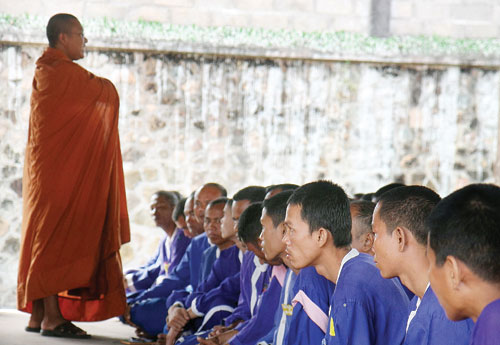

Prisoners transported to the capital from provincial prisons for appeal hearings are being left stranded in prisons around Phnom Penh, according to a report by rights group Licadho.
The prisoners are shuttled by the Interior Ministry’s General Department of Prisons (GDP) to facilities in the city, including Correctional Centres 1 and 2 (CC1 and CC2) and PJ prison, so they can stand trial at the country’s only Court of Appeal.
The problem is, few prisoners are being transported back to the provincial prisons where they originally came from, exacerbating overcrowding in prisons around Phnom Penh and cutting them off from family support available closer to home, the report says.
The prisoner transport program is a nascent project that began over the past year to address in absentia appeal hearings. Before this, inmates in the provinces reportedly had to pay bribes in order to come to Phnom Penh to stand trial.
Last year, 619 inmates were transported to the capital to attend appeal hearings – of which 475 were from the provinces – according to the GDP’s annual report released in March. But Licadho claims “very few” of those have been returned.
As of March this year, there were 583 prisoners awaiting appeal in the nine prisons cited in the report.
Under the Cambodian Code of Criminal Procedure, detainees with pending appeals have to be “transferred without delay . . . to the nearest prison or detention centre to the seat of the Court of Appeal”.
“But unless there has been a decision by the court to give bail or release the prisoner, the authorities must also bring them back to their provincial prisons,” said Naly Pilorge, Licadho’s director.
Instead, Licadho investigators found that inmates either remained in Phnom Penh or were transferred to CC3 in Kampong Cham province – one of the most overcrowded prisons in the country at 191 per cent capacity.
A senior prison official cited in the report claimed there were more than 100 inmates stranded in CC1 alone as the GDP did not have the money to send them back.
“As word gets around that the appeal transport system is a one-way ticket to Phnom Penh, we are hearing that more prisoners are refusing to go,” said Nget Sokun, Licadho’s prison project supervisor.
The report cites a former Battambang prison director who said increasingly most are choosing not to attend hearings or foregoing the chance to appeal altogether as they would remain in Phnom Penh or CC3 if they cannot afford to pay bribes to return.
Last year, Battambang prison transported a total of 80 inmates to Phnom Penh – the highest in the country. Licadho investigators spoke to numerous detainees stuck in Phnom Penh who told them return tickets would cost anywhere from $150 to $300.
Despite the reports, prison officials were adamant that inmates were not denied return transport. GDP director-general Koy Boun Sorn refused to entertain allegations that prison officials took bribes.
Hy Chamroeun, deputy director of Battambang prison, said nobody forces inmates to stay in Phnom Penh.
“It is up to them whether they want to go to Phnom Penh to hear their case,” he added.
But their claims ring hollow – the Licadho report warns that if the GDP does not provide return transportation, it would “defeat the very objective of enabling and encouraging inmates to attend their appeals”.
Ou Virak, Cambodian Center for Human Rights president, said the GDP would be able to find the resources to help these inmates if there was political will to do so.
“There is basically no incentive for prisons to help (these stranded inmates),” he said.
Contact PhnomPenh Post for full article
Post Media Co LtdThe Elements Condominium, Level 7
Hun Sen Boulevard
Phum Tuol Roka III
Sangkat Chak Angre Krom, Khan Meanchey
12353 Phnom Penh
Cambodia
Telegram: 092 555 741
Email: [email protected]










